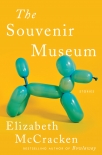The Souvenir Museum by Elizabeth McCracken (essential books to read .txt) 📗

- Author: Elizabeth McCracken
Book online «The Souvenir Museum by Elizabeth McCracken (essential books to read .txt) 📗». Author Elizabeth McCracken
“Are you sure?” Ernest asked.
“What a nice grandpa!” said the lady at the bar. Her sun hat appeared, like its owner, intoxicated but doing its best.
“Not really,” said Bruno.
“I’m just being friendly,” the woman said, in a menacing voice.
“Me too,” said Bruno. To Ernest, he said, “Sit and have a drink. For God’s sake, when were you last alone?”
Ernest took a seat around the corner from the woman, who swiveled on her stool to watch him pass. “I won’t know what to do with myself,” he said, and then shyly, gesturing at Bruno’s wrist, “You’ve got the money.”
“Of course!” He waded back into the pool. “Stay there, Cody.”
“Cold,” said Cody, and shivered dramatically. “Let’s go to the river.”
“You’re doing great,” Bruno said warmly. “Now, how does this work?”
The bartender took his wrist with a tender familiarity, a secret handshake, a pulse-taking. Just in case Bruno hadn’t caught his meaning, the bartender winked, in a cousinly way. He moved Bruno’s wrist past the register, which beeped.
“You could buy me a drink,” said the woman. Her glass was empty; her teeth were blue. “It’s Thanksgiving. It’s Thanksgiving tomorrow. I’m drunk.”
“I know,” said Bruno.
“Really?” said the woman.
“This isn’t, as I believe we say, my first rodeo. And for the lady.” He nodded at the bartender, but perhaps he only longed for another gentle handling of his wrist, the beep that acknowledged a transaction. There it was. “Magic!”
“There’s a transponder,” Ernest explained. “It keeps track.”
“Cloud services,” said Bruno.
“I don’t think so,” said the bartender.
“Cloud services,” said Bruno, more seriously, and Ernest said, “Yes.”
Back inside, around the corner, some poor soul in a dachshund costume talked—no, silently communed—with a tube-topped woman and her crewcutted preteen son. The dachshund costume wore a collar with a large round tag that said SCHATZIE! Its mouth was open in a hideous permanent smile, filled in with a black net grille. Behind the grille glittered a pair of human eyes. Bruno tried to meet them. It was as misbegotten a creature as Hieronymus Bosch ever dreamt up. Bruno and Cody turned onto a bridge, and looked over, and there it was: the river. Families floated along on single inner tubes, or on figure-eight-shaped inner tubes built for two. In Texas, tube was a verb, meaning, to ride upon one. The chlorinated air smelled of infection being held just at bay.
“River,” said Cody.
The bridge led eventually to an artificial beach. The river was circular. On the right families pushed off on their journeys; on the left, they staggered out, pulling their inner tubes behind them. Bruno had the familiar sensation of having washed up himself on some shore, with no memory of his passage—not just how he got here, Schlitterbahn, Galveston, Texas, but his life, in which he lived with a man and had a child and loved both.
He found a double inner tube from a stack near the water, a doughnut on one side and on the other a ring with a plastic floor that said BABY SEAT. MAX WEIGHT 25 POUNDS. He had no idea how much the boy weighed. That was Ernest’s department. Look at him, skinny thing, his rib cage an upturned rowboat. They waded in, and Bruno lifted Cody into the baby seat so he faced forward, could hold on to the handles on either side. They pushed out, and the current took them. Bruno heaved his torso up and grabbed the tube on either side of the boy. They went around a corner, past a palm tree and a flotilla of fully dressed women in hijabs floating together.
He had the panicky, recurring feeling that he’d forgotten to remove his watch, but it was only the shackles of the waterpark around his wrists. Half the people in the artificial river were swimming it, a whirl of limbs, no vessels. Boys, mostly, of all ethnicities, pink and umber and tawny and brown and sienna. It seemed as though there’d been a shipment of boys, and their boat had crashed, and here were the survivors. The Raft of the Medusa at the Waterpark. There were a lot of them, shouting in petrifying pleasure at one another. The water got rougher. Bruno tightened his grip on the rings. “Are you all right?” No answer. He realized with alarm that this had been a rotten idea. Impossible to know how deep the water was. Deep enough to buffet them along. A baby seat? Who would take a baby on something like this? They ran over one of the swimming boys, who popped up choking, laughing.
Bruno knew all the ways you could drown because his mother had told him, and because of Eleanor, now ten years dead, his wife for fifteen years, Eleanor of the psychiatrists and misdiagnoses, Eleanor whom he loved as well as he’d ever imagined loving anyone, until he met Ernest, when he realized his essential trouble might also have been a question of extraordinary misdiagnosis, though he only had himself to blame.
Eleanor, had she been alive, would have made fun of Ernest, not because he was a man (which might have thrilled her) but because he was conventional. A terrible insult, from Eleanor. To not know Faust was the fiction and Goethe the German! They had never had children because she had a horror of a living thing inside her body; she said she couldn’t believe that modern science hadn’t figured out a less barbaric way to reproduce. One that might allow you





Comments (0)